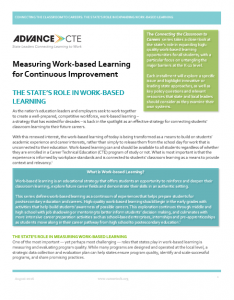 What can state leaders do to expand access to high-quality career technical education (CTE) in rural communities? That was the focus of an event held last Thursday by the Congressional CTE Caucus, in coordination with Advance CTE.
What can state leaders do to expand access to high-quality career technical education (CTE) in rural communities? That was the focus of an event held last Thursday by the Congressional CTE Caucus, in coordination with Advance CTE.
The event featured state and local leaders from diverse geographies, who shared their experiences with delivering CTE in rural communities, highlighting both barriers and best practices. The co-chairs of the Congressional CTE Caucus, Representatives Glenn “GT” Thompson (R-PA) and Jim Langevin (D-RI), also stopped by the event to provide remarks about the value of CTE and weigh in on the state of rural CTE.
As Representative Thompson (R-PA), who comes from a largely rural area in Pennsylvania, noted at the beginning of the event, “CTE restores rungs on the ladder of opportunity. We need to make sure that we are dealing with the barriers,” so that CTE can help close opportunity gaps and extend a bridge to lifelong career success. However, rural communities often face obstacles like scarce resources, critical teacher shortages and a limited employer base that make it difficult to deliver high-quality CTE at scale. As Advance CTE found through their interviews with state CTE leaders, these challenges are common across geographies, yet they are often exacerbated in rural communities (find all of the briefs in the CTE on the Frontier series here).
 How can state and local leaders tackle these challenges? During the event, Dr. Marcie Mack — state CTE director for Oklahoma, spoke about Oklahoma’s career-tech system and the value of employer partnerships in rural CTE, particularly with Oklahoma’s technology center districts, which deliver CTE programs to high school, postsecondary, adult and justice-involved students.
How can state and local leaders tackle these challenges? During the event, Dr. Marcie Mack — state CTE director for Oklahoma, spoke about Oklahoma’s career-tech system and the value of employer partnerships in rural CTE, particularly with Oklahoma’s technology center districts, which deliver CTE programs to high school, postsecondary, adult and justice-involved students.
We were pleased to also feature on the panel a 2018 Excellence in Action award winner, Traverse Bay Area Intermediate School District Career-Tech Center. Stephanie Long, curriculum supervisor for TBAISD, shared about the difficulty of connecting learners from rural districts with the high-quality CTE programming her career-tech center provides. The center serves a region as large as the state of Delaware, with many students traveling hours a day to get to and from classes. The center provides buses during the day and bus passes after school hours to help these learners access high-quality CTE.
 Jan Hanlon, executive director for the Mountain State Education Service Cooperative, discussed how West Virginia is tackling access challenges through Simulated Workplace programs. Through Simulated Workplace, more than 24,000 students annually develop real-world skills by participating in a realistic classroom-based company where they have to meet expectations for attendance, safety, sobriety and professionalism, just as they would need if employed by a local business. Representative Langevin (D-RI) of Rhode Island wrapped up the discussion with an important closing thought: “We can’t expect businesses to grow if we don’t have the workforce available.”
Jan Hanlon, executive director for the Mountain State Education Service Cooperative, discussed how West Virginia is tackling access challenges through Simulated Workplace programs. Through Simulated Workplace, more than 24,000 students annually develop real-world skills by participating in a realistic classroom-based company where they have to meet expectations for attendance, safety, sobriety and professionalism, just as they would need if employed by a local business. Representative Langevin (D-RI) of Rhode Island wrapped up the discussion with an important closing thought: “We can’t expect businesses to grow if we don’t have the workforce available.”
As the event’s panelists underscored, CTE is a critical strategy to help rural America adapt to the 21st century economy. The aftershocks of the Great Recession are still being felt in rural America today, where many learners are disconnected from opportunities to reskill and prepare for the jobs of tomorrow. CTE can help these learners build the skills they need for lifelong success and equip them with the knowledge and abilities to adapt to an ever-changing economy.
Austin Estes, Senior Policy Associate


 Work-based learning provides a continuum of activities — from career exploration and job shadowing to internships and apprenticeships — that help students develop technical and professional skills in an authentic work environment. While many work-based learning programs are designed and operated at the local level, several states have begun building a data collection and evaluation strategy to ensure program quality, identify and scale successful programs, and share promising practices. To support state efforts in this work, Advance CTE today released a brief that explores strategies for measuring work-based learning.
Work-based learning provides a continuum of activities — from career exploration and job shadowing to internships and apprenticeships — that help students develop technical and professional skills in an authentic work environment. While many work-based learning programs are designed and operated at the local level, several states have begun building a data collection and evaluation strategy to ensure program quality, identify and scale successful programs, and share promising practices. To support state efforts in this work, Advance CTE today released a brief that explores strategies for measuring work-based learning.